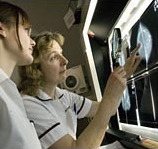Breast Cancer Screening Does Little to Prevent Cancer Deaths, Says Danish Study
by
Brendon Nafziger, DOTmed News Associate Editor | March 31, 2010

The value of breast
cancer screening is again
called into question
In a provocative new study, a Danish team found little improvement in breast cancer mortality from mass mammography screenings.
The results appeared last week in the prestigious British Medical Journal.
"Our study indicates that previous estimates of the screening effect are likely too optimistic," Karsten Jorgensen, head author of the paper and a researcher at the University of Copenhagen, told DOTmed News by email.
His study compared groups of women over a 10-year period in regions with routine screenings for mammograms with those living in areas without such screenings.
Denmark was in a unique position for the study, according to the paper's authors. For nearly 17 years, starting in the early 1990s, only one-fifth of the population, mainly in Copenhagen and the town Fenen, were offered mammography screenings, so the team could directly compare screened populations from these towns with non-screened populations from the rest of the country.
The study found that though deaths from breast cancer were declining in Denmark over this period, they were actually declining slightly faster among the women in the non-screened areas.
Among women 55-74 who were thought to benefit from screening, they found a 1 percent decline in mortality in a group invited to screenings, but a 2 percent decline in the non-invited group.
Interestingly, death rates in the period studied dropped most dramatically among women 35-55, likely too young to benefit from screening because in Denmark screenings were only offered starting at age 50. The breast cancer mortality among these women declined 5-6 percent.
"As these young women actually did experience a much larger decline in breast cancer mortality than women old enough to benefit, we can say with great certainty that other factors than screening have contributed the most to the observed decline," Jorgensen wrote.
Improvements in treatment, diagnosis and awareness of the disease likely contributed to the better survival outcomes, Jorgensen argued.
Other findings of interest: The researchers found no difference in the screened and non-screened group for women over 75, who are believed to have been too old to benefit. Similarly, when they looked at women in the 10-year period before regular screening began (in 1991), they found little differences in mortality between the groups, though women under 75 in the non-screened areas had slightly higher breast cancer death rates.
The results of the paper contradicted a 2005 study in Denmark that pointed to a 25 percent decline from screening. Jorgensen said the results in the early study were seen too soon, three years after screening began. He and his co-authors argue that it would take nearly five years to see the results of screening.
